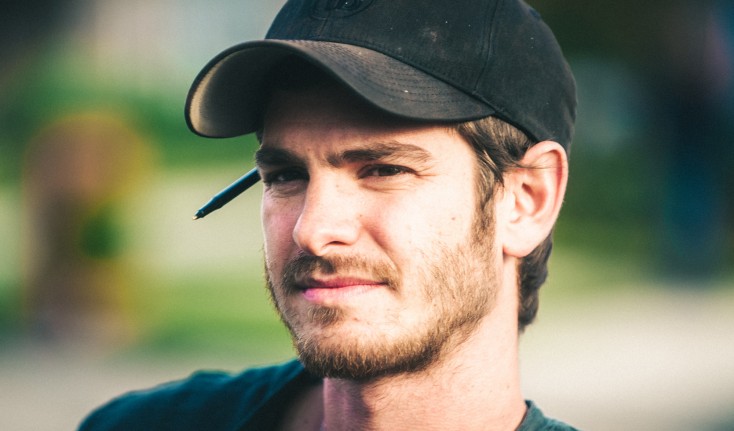
(center l to r) Michael Shannon stars as ‘Rick Carver’ and Andrew Garfield as ‘Dennis Nash’ in 99 HOMES. ©Broad Green Pictures
By ANGELA DAWSON
Front Row Features
HOLLYWOOD—British-American actor Andrew Garfield is a Tony nominated actor who starred alongside Philip Seymour Hoffman on stage in the 2012 Broadway revival of Arthur Miller’s “Death of a Salesman.” Previously, he has earned a highly prestigious BAFTA nomination for his performance in Mark Romanek’s 2010 dystopian alternate history drama “Never Let Me Go.” Most audiences, though, will associate him with his role as Marvel’s web-slinging superhero in two “Spider-Man” movies, “The Amazing Spider-Man” and “The Amazing Spider-Man 2.”
The 32-year-old actor reminds audiences just how versatile he is with his latest performance in “99 Homes,” in which he takes on the role of a young father that will do whatever it takes to protect his mother and young son when their Florida home is foreclosed.
Inspired by the real estate collapse that hit the Sunshine State particularly hard a few years ago, the drama sheds light on the human toll of that man-made catastrophe. Garfield co-stars opposite another renowned actor, Michael Shannon (“Take Shelter,” HBO’s “Boardwalk Empire”), who plays an unscrupulous real estate agent who preys on desperate homeowners.
When Rick Carver (Shannon) arrives with sheriff’s deputies to kick out single dad Dennis Nash (Garfield), he offers Nash an opportunity to regain his home by joining him on a lucrative, law-skirting scheme of gaming the banks, the government and ordinary people to make money from foreclosures. Dennis hopes he can regain his life and he makes the deal, not telling his family. As his mission grows more brutal and ethically bankrupt, Nash comes to realize that Carver’s world of easy riches comes at a price. In the vein of “Training Day,” “Wall Street,” and other films in which people’s core values are tested, “99 Homes” is a thriller that tells the ageless story of greed, injustice and a man confronting a corrupt system.
The drama also stars two-time Academy Award nominee Laura Dern (“Rambling Rose,” “Wild”), who plays Garfield’s mother and 13-year-old Noah Lomax, who plays his son.
The lanky square-jawed actor was so taken with writer-director Ramin Bahrani’s and Amir Naderi screenplay, based on a story by French writer Bahareh Azimi, that he also signed on as a producer.
Garfield, who was born in Los Angeles but grew up in Surrey, England, spoke with people who were directly impacted by the foreclosure crisis and was struck by their stories of struggle and survival.
Q: What did you do in terms of research and getting into the mind of Dennis Nash?
Garfield: It’s weird. I felt like I knew what it was when I read the script, in a weird way. I’ve never been evicted and I’ve never been through these specific circumstances, but I do know the feeling of exile, the feeling of being deemed unworthy as a citizen. I do know the feeling of being treated in a way that doesn’t sit right with my soul. So I had a visceral feeling when I got to page 30 of the script.
Somehow I knew this was everyone’s story. On top of that, going and talking with (displaced) families— men, women and children, who have literally lived through the physical exiles from their homes only added to the depth of responsibility of telling the stories. They’re still struggling and trying to piece their lives back together and form some semblance of something more than survival, to actually live. It was a years worth of laying the foundation, of really knowing the ins and outs springboarded after what (director Ramin Bahrani) already set up for us.
Q: What do you want the audience to get from watching this movie? Does it shed light on the difficulty of today’s young adults to achieve home-ownership?
Garfield: I don’t know if it’s a manual for home-ownership, or how to proceed in that world. I hope it’s a movie that makes us ask more questions. I don’t think it offers any answers or guidance, though. I think its purely an attempt to reflect a kind of messed-up situation that our country specifically finds itself in, where there is this big gaping wound between the have and the have nots.
To me, it appears that neither party is being served. I don’t believe that people with gates and barbed wire fences around their homes have won. They’re in self-created prisons. I don’t think they’re happy. I know people not being served by the system; I know they are not happy. So who is the system in fact serving, apart from itself, in this weird cyclical way? I don’t know. I’m very confused and I think that the majority of the people I sat with had a similar white fog feeling of confusion. Is this the way it’s supposed to be? Is this the way I’m supposed to feel within my life?
It’s something that I believe the soul knows. There is work and healing to be done, so I don’t know what it says about buying a house or selling a house, or anything like that, but I think it’s more of a reflection of where we are, to some extent.
Q: Has there been anything equivalent to this in Britain in recent years, where people, in large numbers, were tossed out of their homes? What do you make of it as someone who’s kind of an outsider watching it over here?
Garfield: I don’t feel like an outsider. I feel like I am an American because I was born here. I’ve spent the last eight years of my life moving back and forth. I don’t think the U.K. suffered in the same way (America did), and continues to suffer, though. I know that the Occupy (Wall Street) movement is alive and strong in London as it was in New York.
A friend of mine in London is going through this very process right now. She lives in a communal housing project and is being forced out. For me, it’s the underlying treatment and psychology of perspective for those who are doing the law’s bidding. It’s unlawful, but there is all this finagling and manipulation that is going on, similar to what the film depicts. It’s the treatment that she’s experiencing from these people who are literally looking down their noses, and subliminally telling them that they believe they are leeches and hold no weight in society.
Again, it comes back to this divide, this lack of compassion for others, that the film is concerned with.
Q: How was it working with Noah Lomax, who plays your son?
Garfield: Noah is the greatest teacher out there because of his lack of self-consciousness. He has just this pure presence. That’s something that I envy in what Noah innately has. The same goes for the non-professional actors (who play the ousted homeowners) I worked with. These people were so brilliantly cast.
Q: This is the first time you’ve played a father onscreen. How did you prepare for the role and what is your inspiration?
Garfield: I kind of thought early on, “I can’t do this. I don’t know what that means, because I’ve never done it,” and then I realized, “Oh, wait. That’s how all men feel when they have kids.” So I felt prepared in my ill-preparedness. (He chuckles.) Noah actually looks like my older brother. That’s kind of what we talked about. Sometimes I am going to feel like a dad and sometimes I’m going to feel like a son in this film. Sometimes I’m going to feel like a big brother that doesn’t want a little brother around. Sometimes I’ll need him to be the strong man. It’s weird, in a good way, where everyone is fulfilling different roles at different times. Working with Laura and Noah, I just felt like we were a family that I hadn’t really seen on film before, so that was exciting.
Q: What do you think is the ideal age for having kids?
Garfield: I don’t know if there is an ideal age to be a father.
Q: It strikes me that it’s really a movie about survival—what you need to do to survive in this world today, and what the price is that we pay, whether we realize we’re paying it or not. What do you say about survival in this day and age?
Garfield: I betray myself every day. I betray myself in small ways and big ways in order to fit in, in order to be accepted and in order to stay on the path I think I’m supposed to be on. So, yeah, I feel afraid as well. In the current modern world, I feel a lot of fear, a lot of instability, to be honest. I don’t feel a great foundation in our culture. As of now, there are great things happening and there are awful things happening. Usually, on the outskirts, it takes a great deal of hunting to find those things, and find something that’s deep and meaningful. I’m so grateful and lucky. Thank God for this medium of storytelling because without this I would be lost. I know I would be. A big part of survival, for me, is that I get to give myself to something that feels meaningful. When a story like this comes along, it’s really impossible to say no because that’s my idea of what the essence of the story really is. That’s my shallow answer to a vey difficult question.





